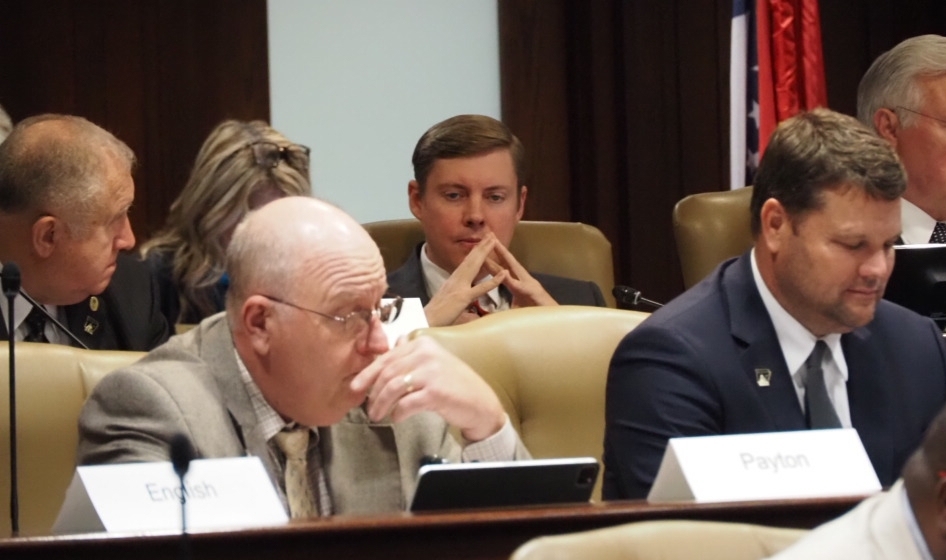Arkansas Fiscal Session: Crypto Regulations and Lectern Audit Take Center Stage
4 min read
Last week Arkansas Gov. Sarah Huckabee Sanders signed the first of many appropriations bills for her proposed $6.3 billion state budget that will head to her desk in the coming weeks.
Sanders signed a general appropriations bill for the judicial branch, the legislative branch and the state auditor, as well as a separate bill setting money aside for the House of Representatives.
While the fiscal session is primarily for budgetary matters, regular bills can be introduced under specific conditions. Both chambers allowed the introduction of a bill filed Wednesday that would give executive branch employees a 3% cost-of-living pay raise and increase the maximum salary of all employees’ pay grades by 10%.
Lawmakers can also hold committee meetings unrelated to legislation if need be, such as Tuesday’s discussion of a long-awaited report scrutinizing the $19,000 purchase of a lectern by Sanders’ staff last year.
1) ‘Lecterngate’
Arkansas Legislative Audit highlighted several potential breaches of state law in its report on the lectern purchase, released April 15.
Among other things, auditors found that Sanders’ staff failed to create a business justification statement for the purchase, shredded a document that included details about the lectern necessary to properly record the purchase, sought reimbursement for the lectern from the state Republican Party instead of seeking an exemption from state purchasing and property disposal laws, and likely altered public records.
Representatives of both Sanders and Attorney General Tim Griffin fielded questions from lawmakers and defended the purchase at a three-hour meeting Tuesday.
Arkansas lawmakers question governor’s lectern purchase, potential law violations found in audit
Judd Deere, Sanders’ deputy chief of staff, said he instructed the governor’s executive assistant, Laura Hamilton, to write “to be reimbursed” on two copies of the invoice for the lectern. Cortney Kennedy, Sanders’ chief legal counsel, called this “a common government practice.”
Griffin’s staff repeated the office’s stance that the governor is exempt from certain state purchasing laws. The audit report asserts the opposite.
Lawmakers from both parties raised concerns about both the report’s findings and Deere and Kennedy’s answers to questions about them.
“I don’t really hear the governor’s office or governor’s staff saying, ‘We should have done it a different way,’” said Sen. John Payton, R-Wilburn. “Instead they’re trying to justify how they did it.”
The audit report has been sent to both Griffin and Sixth Judicial District Prosecuting Attorney Will Jones. No word yet on what, if any, action either will take.
2) Cryptocurrency regulations
By April 15, the Senate had passed eight resolutions to allow the introduction of bills to regulate cryptocurrency mining operations. Six of them failed in the House on Wednesday, and only the two that passed both chambers could be introduced and considered.
Crypto mines, large groups of computers that harvest digital currency, are often located in rural areas because they take up a lot of space. They also require significant energy to operate and water to keep computers cool.
Six of eight crypto mining resolutions fall short in Arkansas House
The Arkansas Data Centers Act of 2023 limited local governments’ ability to regulate crypto mines. The law passed both chambers with bipartisan support, but some lawmakers have since expressed regrets and concerns about it, especially because some crypto businesses have set up shop in Arkansas since the law passed. There are currently crypto mines in Faulkner and Arkansas counties.
Sen. Bryan King, R-Green Forest, sponsored the six resolutions that failed and expressed frustration about the two that passed, saying the proposed regulations aren’t strong enough.
One bill would place noise limits on Arkansas crypto mines, prohibit them from being owned by certain foreign entities and allow local governments to pass ordinances regulating the mines. Sen. Joshua Bryant, R-Rogers, is the bill’s sponsor and was also the lead sponsor of the Arkansas Data Centers Act.
The other bill would require crypto mines to be licensed by the state Department of Energy and Environment and require the department to inform legislative committees of its crypto regulation methods. Lead sponsor Sen. Missy Irvin, R-Mountain View, said the two bills lay the groundwork to use “several layers of tools” to both regulate the crypto industry and discuss more regulations down the road.
A Senate committee approved the bills Thursday and will hear more public testimony about them Tuesday.
3) Pregnancy resource center funds
Arkansas has provided financial support to pregnancy resource centers, sometimes called “crisis pregnancy centers,” with a $1M annual taxpayer-funded grant since 2022. These centers are often religiously affiliated, and the rules of the grant require recipients to encourage birth and oppose abortion.
An appropriation bill sponsored by Payton would double the amount available in the grant with the purpose of supporting more facilities, he said last week.
Some Democratic lawmakers said they were concerned that clients can mistake pregnancy resource centers for doctors’ offices and might not receive further prenatal health care.
Rep. Denise Garner, D-Fayetteville, asked if there was a way for the state to ensure that the centers’ clients also visit doctors’ offices; Payton said he disagreed with Garner’s “government tracking” idea.
Arkansas pregnancy centers seek help with advertising, material needs from $1M state grant
Over the past two years, the centers have used the money for digital and physical advertising, as well as baby supplies, rent and utilities, part-time or full-time staff salaries, and birthing and parenting classes, among other things.
Twenty-three centers received funds from the first year of the grant between September 2022 and January 2023. Twenty-one repeat applicants and six new applicants received money this January for year two of the grant.
The Joint Budget Committee will take up Payton’s bill for approval after a subcommittee approved it Thursday.
The House and Senate are scheduled to convene at 1 p.m. Tuesday.
Source link
#SESSION #SNAPSHOT #Crypto #regulations #lectern #audit #talk #Arkansas #fiscal #session #Arkansas #Advocate





